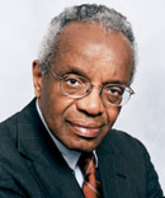Recently, several news outlets have made a modest effort at remembering significant contributors, namely Reverend Fred Shuttlesworth and Professor Derrick Bell to the Civil Rights Movement who passed away at around the same time as  Steve Jobs. Their passing reminds me that while the label “Christian” appears more often in association with conservative politics, a persistent voice remains on the progressive end of the spectrum as well, that of the Black Church. For those who are less familiar, the Black Church consists of several Protestant denominations that
Steve Jobs. Their passing reminds me that while the label “Christian” appears more often in association with conservative politics, a persistent voice remains on the progressive end of the spectrum as well, that of the Black Church. For those who are less familiar, the Black Church consists of several Protestant denominations that are predominantly constituted and led by African American Christians such as the African Methodist Episcopal Zion Church, the National Baptist Convention and the Church of God in Christ. Through these churches the Southern Christian Leadership Conference emerged and helped galvanize an effective and non-violent effort to bring racial justice for African Americans especially for those in the South who dealt with systemic inequalities codified under Jim Crow laws.
are predominantly constituted and led by African American Christians such as the African Methodist Episcopal Zion Church, the National Baptist Convention and the Church of God in Christ. Through these churches the Southern Christian Leadership Conference emerged and helped galvanize an effective and non-violent effort to bring racial justice for African Americans especially for those in the South who dealt with systemic inequalities codified under Jim Crow laws.
Having taught the sociology of race, class, and gender at a faith-based university, I am continually confronted with the reality that education and awareness about racial inequality is remarkably weak at the secondary school level. I do not blame teachers who are already straddled with a million other problem areas confronting students such as basic writing, discipline, and sustained focus. What saddens me instead is that while students might “sort of” remember who Martin Luther King Jr. was, he is not remembered as “the Reverend” Martin Luther King, a pastor turned social movement leader. Injustice against African Americans and other racial minorities is a vague abstract notion, about as real as peasant life caricatured in Monty Python’s Holy Grail . Consequently without some exposure to the religious roots of this movement, young men and women of all racial backgrounds wind up, in my opinion, with an impression that racial justice has little to do with religion.
Given the Christian roots of the Civil Rights Movement, one might imagine that American Protestant schools would take pride in this historical fact and incorporate it into their curricula as part of their development of Christian character and identity. Standing up for racial equality in the face of systemic mistreatment of a racial minority group could be seen as an application of the social gospel. If that’s not sufficient, identification with suffering fellow Christians in a universal faith that spans color and culture would be a more “religious” frame by which to understand the importance of this movement and its leaders. Instead, I find little evidence that Protestant Christian schools give much attention to this in their curricula from grade school through college. I sense that many Christians view matters of racial equality as a secular government effort, and by extension an effort to be viewed with much suspicion if not derision.
But wait, surely this doesn’t apply to African Americans who participate in the Black Church right? While most of them are educated in public neighborhood schools, they can still access the historic contributions of their predecessors through education at their local congregations. Indeed unlike most white evangelical churches, political awareness and participation is very much a part of the culture of the Black Church. Presumably this might include at least some symbolic efforts to educate the laity about the religious history of the Civil Rights Movement. To the extent that young African American men and women receive some kind of religious education we might expect that they will remember Professor Derrick Bell’s and Reverend Fred Shuttlesworth’s contributions to the movement that expanded the freedoms they experience today.
So this presents an unfortunate picture of American racial politics today. Due to an absence of education about contemporary religiously-motivated social movements in public schooling and private Christian schooling, the average student will not identify the Civil Rights Movement with Christianity. Thus most students will interpret institutionalized programs that were borne out of the struggle to address systemic racial inequity as a secular movement. For the devout Christians, I’d expect that they will more often reject such programs on the grounds of preventing secular encroachment in the private domain where religious expression is protected under law. Those who participate in the Black Church however will stand in support of these programs knowing full well that its roots lie in the very application of Christian theology.
What do you remember learning about the Civil Rights Movement and in what context did you learn it?











